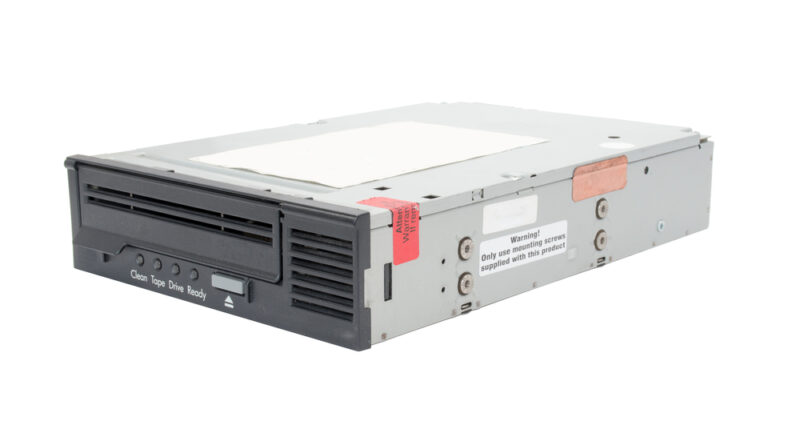The Role of Tape Drives in Modern Data Storage
In today’s rapidly evolving technological landscape, data storage has become a critical part of IT infrastructure. As data continues to grow exponentially, businesses and organizations are constantly seeking efficient, reliable, and cost-effective methods to store large amounts of information. One technology that has stood the test of time and remains relevant in modern storage solutions is the tape drive.
Though tape drives may seem like an older technology compared to flash storage or hard drives, they are far from obsolete. In fact, tape drives offer several unique advantages that make them a valuable component of long-term data storage strategies, particularly in industries that need to archive vast amounts of data. In this guest post, we will explore what tape drives are, their role in modern IT hardware, and why they continue to be a preferred choice for many organizations in the context of computer hardware, storage devices, and technology.
What is a Tape Drive?
A tape drive is a type of data storage device that reads and writes data on a magnetic tape. The technology dates back to the 1950s and has evolved significantly over the decades. Unlike solid-state drives (SSDs) or hard disk drives (HDDs), which offer random access to data, tape drives use sequential access, meaning data is written and read in a linear fashion. This sequential access allows tape drives to store vast amounts of data efficiently.
Tape drives are typically used for backup, archiving, and disaster recovery, making them ideal for businesses that need to store large volumes of data securely for long periods. Industries such as healthcare, finance, and entertainment, which generate massive amounts of data daily, rely on tape storage for its durability, security, and cost-effectiveness.
The Role of Tape Drives in IT Hardware
In the realm of IT hardware, tape drives are a crucial part of a broader data storage strategy. While they are not used for fast, day-to-day data access, they excel in long-term data retention, backup, and recovery purposes. As Storage Devices, tape drives are designed to handle data archiving with high reliability and low failure rates compared to other forms of storage media.
One of the most significant advantages of tape drives is their ability to store large amounts of data at a relatively low cost. Unlike hard drives or cloud-based storage, tape drives have a lower cost-per-gigabyte ratio, making them an economical solution for businesses that need to archive data but don’t require constant access to it. Tape drives are ideal for cold storage—data that needs to be kept but will rarely be accessed.
In addition, tape drives consume far less power than hard drives or server-based storage solutions, which translates into lower energy costs for businesses. Since tape drives don’t need to be powered on constantly and can be kept offline until needed, they offer both a cost-efficient and environmentally friendly solution for organizations with massive data storage needs.
Tape Drives vs. Modern Storage Devices
When comparing tape drives to more modern storage devices such as SSDs and HDDs, it’s essential to understand their different use cases and advantages. Tape drives are not designed to replace SSDs or HDDs, but rather to complement them in a tiered storage strategy.
- Speed and Accessibility:
SSDs and HDDs are faster and provide random access to data, making them ideal for primary storage or frequently accessed data. Tape drives, on the other hand, are slower due to their sequential access nature. However, the focus of tape drives is not speed but the ability to store massive amounts of data for backup and archiving purposes. - Cost Efficiency:
When it comes to cost per terabyte, tape drives are more economical than SSDs and HDDs, especially for long-term storage. Businesses that need to retain large amounts of data for legal or compliance reasons often find tape drives to be the most affordable option. - Durability and Longevity:
One of the key selling points of tape drives is their durability. Magnetic tapes can last for decades when stored properly, whereas HDDs and SSDs tend to have shorter lifespans, especially if they are in constant use. This makes tape drives an excellent choice for disaster recovery and long-term data archiving, where data integrity over time is crucial.
Use Cases for Tape Drives in Technology
Tape drives continue to play a significant role in modern technology infrastructure, particularly in data-intensive industries. Below are some of the most common use cases for tape drives in today’s IT hardware ecosystem:
- Data Archiving and Compliance:
In industries like healthcare, finance, and government, compliance regulations often require organizations to retain data for extended periods, sometimes spanning decades. Tape drives provide a cost-effective solution for archiving data securely and ensuring it remains intact for future reference. Magnetic tapes are also less susceptible to data corruption compared to hard drives, making them a reliable choice for long-term archiving. - Backup and Disaster Recovery:
One of the most traditional uses of tape drives is for backup and disaster recovery. In the event of data loss due to hardware failure, cyberattacks, or natural disasters, tape drives offer a secure, offline backup option that can be restored quickly. Since tape drives are kept offline, they are immune to ransomware attacks that target online storage systems, making them an essential component of a robust disaster recovery plan. - Cold Storage for Cloud Providers:
Many cloud service providers use tape drives for cold storage. While the cloud may seem like the most modern form of storage, tape drives are still utilized behind the scenes to store massive amounts of data that customers rarely access. This approach helps cloud providers reduce storage costs and ensure they can offer affordable services to customers. - Media and Entertainment Industry:
The media and entertainment industry produces vast amounts of video and audio data that needs to be archived for future use. Tape drives offer a high-capacity, low-cost solution for storing raw footage, master recordings, and other valuable media assets. Furthermore, because tape drives are removable and easily stored in controlled environments, they are a practical choice for organizations in this industry.
The Future of Tape Drives in Technology
As technology continues to evolve, so do tape drives. The latest innovations in Tape Drive technology have led to increased storage capacities and faster data transfer rates. For example, LTO (Linear Tape-Open) technology, which is one of the most popular tape formats, has seen steady improvements in performance and capacity over the years. LTO-9, the latest iteration, can store up to 18 terabytes of data per tape, with transfer speeds of up to 400 MB/s, making it more efficient for large-scale backups.
Moreover, tape drives are also becoming more energy-efficient. The fact that they are not powered on constantly and can remain offline for extended periods means they consume far less energy compared to spinning hard drives in data centers. With the increasing focus on green IT and reducing carbon footprints, tape drives are an attractive option for companies looking to build sustainable data storage solutions.
While flash storage and cloud storage are essential in the modern digital landscape, tape drives will likely continue to play a critical role in backup, archiving, and disaster recovery due to their unique advantages in terms of cost, reliability, and longevity.
Conclusion:
Despite the rise of newer storage technologies, tape drives remain a relevant and effective solution for many storage needs. Their ability to store vast amounts of data at a low cost makes them ideal for businesses that need reliable and durable storage devices for backup, archiving, and disaster recovery.
In the broader context of IT hardware and Technology, tape drives are unlikely to disappear anytime soon. Instead, they will continue to evolve alongside other computer hardware solutions, offering a complementary option for companies that need long-term storage without the high costs associated with SSDs and HDDs. By incorporating tape drives into a tiered storage strategy, businesses can optimize their data storage solutions for efficiency, cost, and security.
In an era where data is everything, having the right mix of storage devices is crucial, and tape drives will remain a key player in the future of storage technology.




